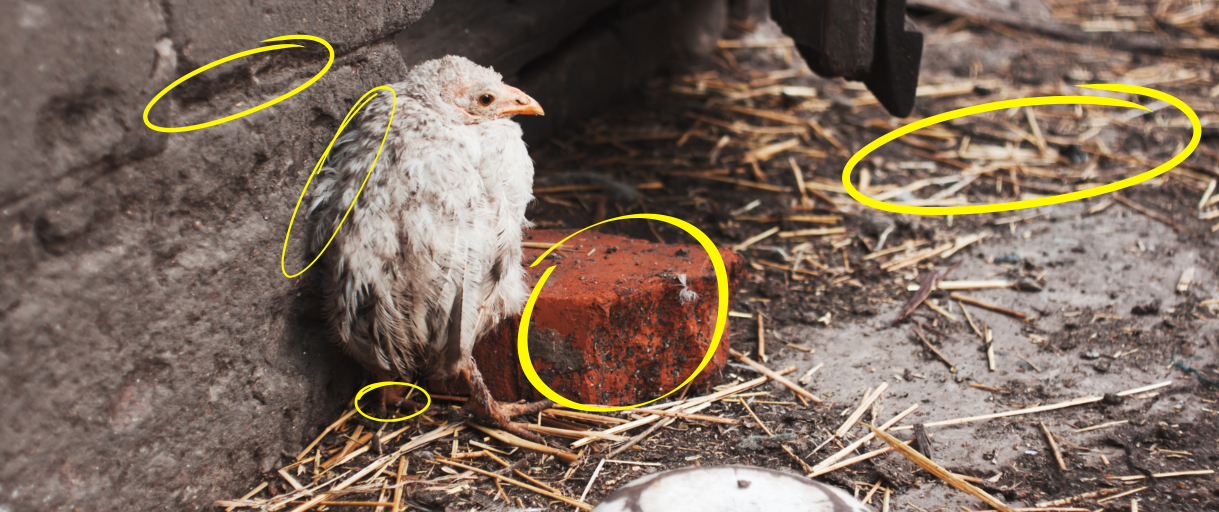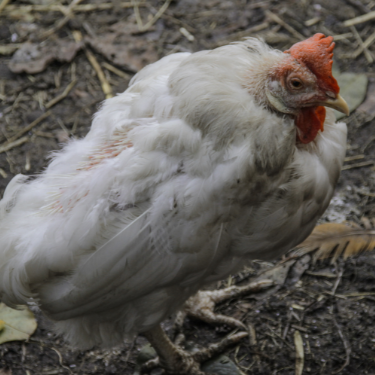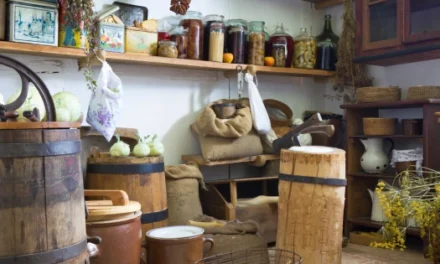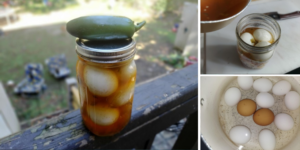You might not even realize it, but some of the most common things around your homestead could be quietly putting your entire flock at risk. A small oversight, like feed left too long in the trough, water that looks “mostly clean,” or a few harmless weeds sprouting around the coop can kick off a chain of health problems that seem to come out of nowhere. And the worst part? You often won’t spot the warning signs until it’s too late, when your chickens are already sick or their egg production drops to nothing.
Your chickens deserve better, and so do you. Beyond losing birds to sudden illness, these invisible dangers can work their way into your family’s meals too, through contaminated eggs, meat, or even the dust they leave behind. Let’s take a closer look at the hidden threats lurking in your backyard before they steal your birds’ health — or even worse — end up on your dinner table.
Signs Your Flock Might Be Sick
Not every unusual behaviour can be an indicator that your chickens are not feeling well.
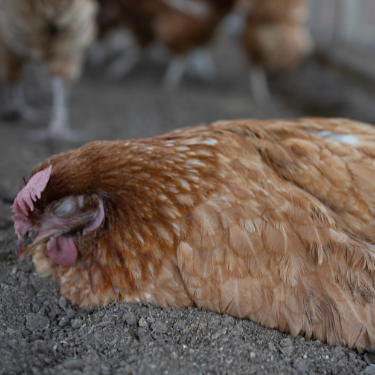
Sometimes these animals can act abnormally without any specific reason. However, with that said, there are still some signs that must not be overlooked at any cost. These can include:
- A chicken isolating itself from the rest of the flock.
- A sudden drop in egg production.
- Previously active birds becoming unusually lethargic.
- Watery, discolored, or foul-smelling droppings.
- Loss of feathers (outside normal molting) and decreased appetite.
- Sneezing, wheezing, or labored breathing.
If you spot any of the symptoms above for more than 2 days, assess what is wrong with your chicken coop.
Things That Might Be Making Your Chickens Sick
While living on a homestead, we all try to mix and match strategies to do our best. But sometimes this trial-and-error process may end in odd instances. This can actually be true in terms of keeping a coop, where every action must be carefully curated. Even then, mistakes can happen, which can eventually make your chickens sick.
Some of these mishaps may be related to:
Contaminated Feed and Water
One of the most common reasons behind your chickens falling sick more often might be spoiled feed and water. It is not that you may be doing this knowingly. But sometimes you may think the water or the staple may do fine even when not changed. What you and many homesteaders might forget is that this stale feed can cause severe digestive problems — and not just for your birds. Parasites and harmful bacteria that thrive in dirty conditions can end up in their meat or eggs, easily making their way into your own food supply and putting your whole family at risk.
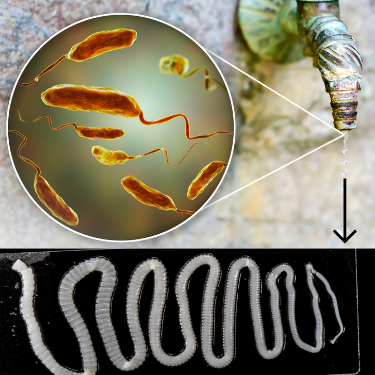
And it is not just about the feed. The water, when not sealed properly, can also go stagnant, becoming a breeding ground for infectious germs that can affect you too. To remain on the safer side, always store your chickens’ feed properly when they are done eating. Moreover, don’t forget to cover the water source with a lid to prevent any bacteria from growing inside it.
Secure your water source — if your water becomes contaminated, it’s only a matter of time before your flock pays the price, and then you might be next. Chickens can’t thrive without a clean, steady supply, and there’s no quick fix once bacteria sets in. That’s why making sure their water stays pure is so important.
Humans, as well as livestock, simply can’t survive without clean water. There’s no substitute and no trick to stretch it. One of the simplest solutions is this backpack-sized water generator. It’s small, affordable, and highly effective, pulling moisture from the air and turning it into up to 40 gallons of pure water per day.
Poor Coop Hygiene
A coop is your chickens’ safe haven where they can rest. This place not being comfortable can cause your feathered friends to suffer. And it is not just about the comfort, it is about your chickens’ health. When this space is filled with droppings, ammonia levels can rise fast. This can, in turn, irritate your bird’s eyes and lungs and can even suffocate them to death.
A rule of thumb is to clean your chicken’s coop twice a week. Consider replacing the bedding on a regular basis to provide a safe environment for them to thrive.
Stress Due to Overcrowding
When space, feed, and water are limited, chickens may then compete with each other for survival. As a result, constant competition may settle in amongst the birds, and very few of them may survive. The healthier or dominant chickens may peck at the weaker ones, causing feather loss, injuries and even infections.
But that’s not it. This overcrowding, combined with constant competition, can also make it easier for diseases to spread. It will not be too late when you notice one bird has contaminated the other members of the flock.
All of these consequences can be avoided by just providing enough space for your chickens. Additionally, also settle various feeders and waterers so every bird gets enough food and water supply.
Invasion of Pests and Parasites
No matter how safe and secure your chicken’s coop is, mites, lice, or even parasites can find their way into it. And once they get in touch with any of your chickens, be prepared to watch the whole flock suffer at the same time.
Sometimes, the signs of this pest’s invasion can be as mild as your chickens feeling lethargic. Other times, these symptoms can be fatal, such as your flock suddenly losing weight or feathers. When not addressed on time, these signs can become even adverse, eventually leading to death.
➡️Why the Amish Hardly Ever Have Pest Problems in Their Gardens
In order to avoid all this, conduct regular flock inspections. Look for signs such as restless behaviour or excessive pecking or scratching. Ensure to clean the birds regularly and rotate the pasture if possible. Furthermore, if you detect any worm invasion, ensure to contact a credible veterinarian.
Growth of Toxic Plants in the Coop
Chickens are the most curious peckers and will peck at almost anything green that comes in their sight. In this case, if any poisonous plants grow up in their surroundings, they will nibble on them as well. While these toxic herbs may not cause any harm at first, but they can poison your chickens slowly and gradually.
Now, you cannot teach birds which herbs they must peck and which ones to avoid. But you can create a better and safer environment for them by removing toxic plants from their coop.
To do so, regularly walk through your chicken’s coop and remove a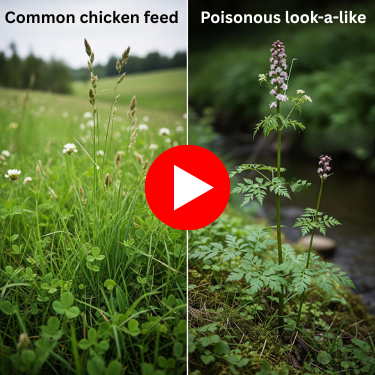 ny plants you come across as suspicious. Additionally, for promoting healthy foraging, grow healthy herbs such as parsley, mint, or oregano.
ny plants you come across as suspicious. Additionally, for promoting healthy foraging, grow healthy herbs such as parsley, mint, or oregano.
The truth is, the world is full of dangerous plants hiding in plain sight — often right in your backyard or coop. Some look nearly identical to the safe herbs and greens you already use. They don’t taste bitter. They don’t look “evil”. But it’s more to them than meets the eye.
One wrong nibble can mean kidney failure, respiratory distress, or a slow, painful decline you might not even recognize until it’s too late. Even a single leaf or flower can do serious damage — and when you’re dealing with curious chickens, they won’t hesitate to peck at anything green.
That’s why this isn’t something you can afford to leave to guesswork. Learning to recognize these deadly look-alikes before they ever sprout up near your birds is the only way to truly keep them safe. Once you know what to look for, that fear disappears — and you can focus on raising a healthy, thriving flock without wondering what’s lurking in the grass.
👉 Learn which plants are toxic before it’s too late
Predator Pressure and Fear
You may not see them. You may not hear them. But lurking just beyond your chicken run are creatures that see your flock as an easy meal — raccoons, foxes, snakes, hawks, weasels, even stray dogs.
Your chickens don’t have to be physically attacked to feel unsafe. Even if they never make it inside your coop, their mere presence of predators can terrorize your birds. This ongoing fear can cause stress, and stress can make your chickens more prone to illness.
Signs that predators might be around include:
- Nervous or jumpy behavior.
- Hesitation to come out of the coop or feed.
- Sudden decrease in egg production.
- Unexplained injuries or missing feathers.
If you don’t take these warning signs seriously, one successful predator visit can wipe out an entire flock overnight.
To protect your birds (and your peace of mind) predator-proof your coop like your chickens’ lives depend on it. Check latches and doors every single night. Bury fencing at least a foot into the ground to prevent digging, and cover the top of the run with strong wire or netting. Shine a light into the dark corners of your property and look for signs of prowling animals. Don’t wait until it’s too late. Once a predator learns that your chickens are an easy target, they’ll keep coming back until there’s nothing left.
But here’s the thing — no matter how well you secure your coop or how carefully you monitor your flock, some sneaky predators always seem to find a way in. They’re clever, persistent, and they only need one weak spot to do serious damage.
If you’re serious about keeping these threats at bay, you might want to go one step further and set up an automatic chicken predator trap. This isn’t your average DIY setup. It’s a hands-free trap that works around the clock, quietly catching even the craftiest raccoons, weasels, and rats before they ever get close to your birds.
And the best part? You can easily build it yourself. This guide walks you through each step, showing you exactly how to put together a simple, foolproof trap that will give you real peace of mind. Trust me, once it’s in place, you’ll sleep a lot better knowing your flock and your feed are finally safe.
How to Take Care of Your Livestock When They Are Sick — Learn From the Amish
When one of your animals falls sick, it can go downhill fast — and there’s nothing scarier than watching a once-healthy chicken or goat grow weaker by the hour. Too often, we realize too late that we don’t have the right remedy on hand, and by then, vet bills or losses can hit hard.
That’s why it’s so important to be prepared before you ever face a crisis. The Amish have survived generations without relying on expensive medications or outside help, using only the practical, time-tested methods they’ve passed down for years.
And inside The Amish Ways, written by a former Amish member who knows these traditions inside and out, you’ll discover more than just cures for common livestock ailments. You’ll learn proven treatments for sick chickens and other animals — plus the everyday skills that help Amish families stay self-reliant and resilient, no matter what surprises come their way. And I also managed to get you a special discounted price, available for a limited time period only.
You can access my personal discount from the button below!
Don’t wait until an illness spreads through your barn or coop. Being ready with these simple, trusted solutions could make all the difference.
Final Thoughts
Raising chickens is deeply rewarding, but it requires constant care and a watchful eye. Sometimes, the smallest overlooked detail can put your flock’s health at risk. Keep learning, stay observant, and your chickens will reward you with fresh eggs and happy clucks for years to come!
I Fed Stinging Nettles to My Chickens, and This Happened
How to Take Care of Your Livestock When They Are Sick (Video)
Automatic Chicken Feeder That Needs No Electricity: How Do You Make It?

